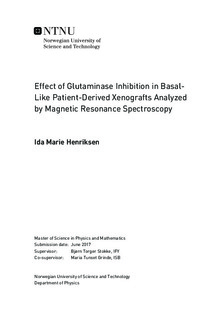Effect of Glutaminase Inhibition in Basal-Like Patient-Derived Xenografts Analyzed by Magnetic Resonance Spectroscopy
Master thesis
Permanent lenke
http://hdl.handle.net/11250/2470893Utgivelsesdato
2017Metadata
Vis full innførselSamlinger
- Institutt for fysikk [2698]
Sammendrag
Breast cancer is today the leading cause for cancer related deaths among women in Europe. Decreased mortality among breast cancer patients has been observed over the last twenty years, where development and use of targeted therapies, utilizing hormone dependence, are believed to be part of the reason. Some subtypes of breast cancer still have poor prognoses for patients, where basal-like/triple-negative breast cancer (TNBC) patients have the worst predictions. Most basal-like tumors are triple negative, i.e. they lack expression of hormone receptors (estrogen (ER) and progesterone (PgR)) and human epidermal growth factor receptor 2 (HER2). Targeted treatment options for these patients are therefore limited, but use of glutaminase inhibitors have shown to be a potential treatment option for these patients. TNBC models have shown to be more dependent on L-glutamine and respond better to the glutaminase inhibitor CB-839 than ER-positive models, both in in vitro and in vivo xenograft models. CB-839 is currently under early stage clinical trials, but more information about the metabolic response of CB-839 in basal-like tumors is needed to identify patients likely to respond to treatment with CB-839. A patient-derived xenograft model named MAS98.12, displaying a basal-like/TNBC phenotype, has previously been established and is characterized in this study.
The aim of this study is to add more information about the metabolic response of CB-839 treated basal-like MAS98.12 tumors in mice. Tumor tissue and serum samples from CB-839 treated mice (n=6) and control mice (n=5) were harvested after injection of [5-13C]L-glutamine. 13C and 1H MR spectra were acquired and analyzed by integration, multivariate analyzes (PCA and PLS-DA), and univariate analyzes (Student s t-test and Wilcoxon rank sum test). Significantly higher levels of L-glutamine were found in tumor samples treated with CB-839 than in controls, suggesting that CB-839 inhibits conversion from L-glutamine to L-glutamate. A previous study of CB-839 showed no effect on tumor growth in basal-like PDX model MAS98.12 when treated with CB-839. Overall, these results imply that MAS98.12 tumors are not dependent on L-glutamine for tumor growth. 13C-labeled L-glutamate and L-lactate were also observed in the MR spectra of tumor tissue, but no significant differences were found between with CB-839 treated mice and controls. In serum samples, a significantly higher level of 13C-labeled L-glutamine was also detected in CB-839 treated mice compared with controls, suggesting that CB-839 leads to a decrease in the overall uptake of L-glutamine from the bloodstream to other organs of the mouse.
